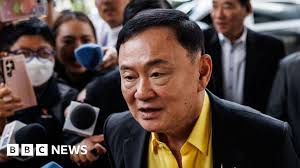
BBC:
A court in Bangkok is due to rule on a case of lese majeste involving controversial billionaire and former Thai prime minister Thaksin Shinawatra.
If found guilty, Mr Thaksin could face up to 15 years in jail. The charge relates to an interview he gave to a South Korean newspaper ten years ago.
Thailand’s lese majeste law forbids insulting its monarchy. But critics say it is often used to target activists and political opponents.
The verdict comes as Mr Thaksin’s daughter, suspended PM Paetongtarn Shinawatra, faces a court case that may see her removed from office. The legal cases have been seen as a big blow to the Shinawatra clan, which has dominated Thai politics for decades.
Mr Thaksin’s charge was originally filed by the then-military government in 2016, when he was in exile, and re-activated last year after his return to Thailand.
At first glance the case against him seems weak.
In the South Korean newspaper interview, the former prime minister said he believed the 2014 military coup which deposed the elected government of his sister Yingluck – just as he had been deposed by a previous coup in 2006 – had been instigated by “some people in the palace” and members of the privy council, the 19-member body which advises the Thai king.
Technically the privy council is not covered by the lese majeste law, which states that it is an offence to defame only the king, queen, heir to the throne or anyone acting as regent.
However, in recent years the law has been invoked to criminalise any action or statement which might reflect negatively on the monarchy as an institution.
In the past people have been prosecuted for making unfavourable comments about the late King Bhumibol’s dog and about a Thai king from the 16th Century.
More recently, a young woman was sentenced to five years in prison for placing a banner criticising the budget to help those affected by Covid close to a portrait of King Vajiralongkorn.
The interpretation of the law has become so broad that human rights groups now view it as a political tool, which can be used to intimidate and silence those who challenge the status quo.
Many believe this is what is happening to Mr Thaksin.
This verdict comes exactly two years after the former prime minister’s dramatic return from 15 years of exile.
At the time it was assumed there had been a grand bargain struck between Mr Thaksin and his long-time conservative adversaries, so that his party Pheu Thai, which in the 2023 election had been relegated to second place from its usual number one spot, could form a coalition government and keep the young reformists who had actually won the election out of power.
The terms of that bargain have never been made public – Mr Thaksin has always insisted there was no deal – but it is likely they included an agreement that he would keep a low profile and stay out of politics.
But a low profile is something completely alien to the flamboyant, wealthy and ambitious tycoon.
He is still believed to be the largest funder of Pheu Thai and makes all of the main decisions for the party.
When his first choice of prime minister, businessman Srettha Thavisin, was disqualified by the persistently interventionist Constitutional Court a year ago, Mr Thaksin’s inexperienced daughter Paetongtarn took the helm, becoming Thailand’s youngest ever prime minister.







 Users Today : 1546
Users Today : 1546 Users Yesterday : 1602
Users Yesterday : 1602 This Month : 30740
This Month : 30740 This Year : 163475
This Year : 163475 Total Users : 521452
Total Users : 521452 Views Today : 2474
Views Today : 2474 Total views : 1662572
Total views : 1662572 Who's Online : 12
Who's Online : 12